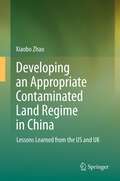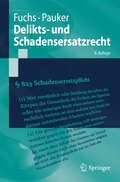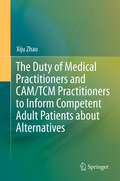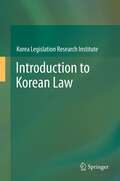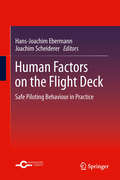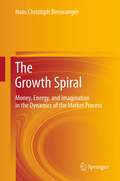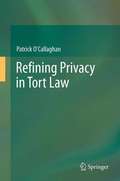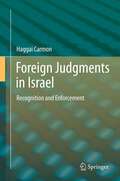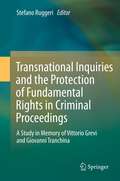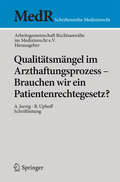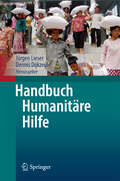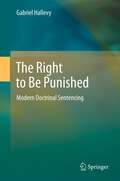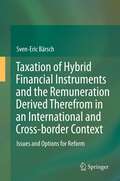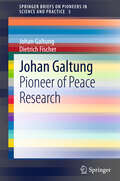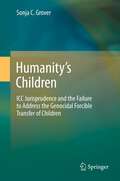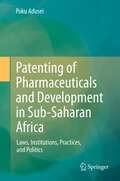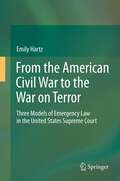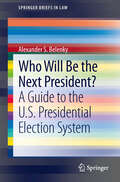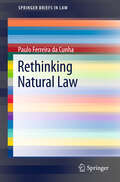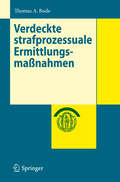- Table View
- List View
Arthur H. Westing: Pioneer on the Environmental Impact of War (SpringerBriefs on Pioneers in Science and Practice #1)
by Arthur H. WestingSince the 1960s the environment has become an issue of increasing public concern in North America and elsewhere. Triggered by the Second Indochina War (Vietnam Conflict) of 1961-1975, and further encouraged by the International Conference on the Human Environment, held in Stockholm in 1972, the environmental impact of war emerged and grew as a topic of research in the natural and the social sciences. And in the late 1980s this led additionally to a focus and debate on environmental security. Arthur Westing, a forest ecologist, was a major pioneer contributing and framing both of those debates conceptually, theoretically, and empirically, starting with Harvest of Death: Chemical Warfare in Vietnam and Cambodia (1972) (co-authored with wildlife biologist E.W. Pfeiffer and others). As a Senior Researcher at the Stockholm and Oslo International Peace Research Institutes (SIPRI and PRIO), and as a Professor of Ecology at Windham and Hampshire Colleges, Westing authored and edited books on Ecological Consequences of the Second Indochina War (1976), Weapons of Mass Destruction and the Environment (1977), Warfare in a Fragile World: Military Impact on the Human Environment (1980), Herbicides in War: the Long-term Ecological and Human Consequences (1984), Environmental Warfare: a Technical, Legal and Policy Appraisal (1984), Explosive Remnants of War: Mitigating the Environmental Effects (1985), Global Resources and International Conflict: Environmental Factors in Strategic Policy and Action (1986), Cultural Norms, War and the Environment (1988), Comprehensive Security for the Baltic: an Environmental Approach (1989), and Environmental Hazards of War: Releasing Dangerous Forces in an Industrialized World (1990) --- as well as authoring numerous UN reports, book chapters, and journal articles. This volume combines six of his pioneering contributions on the environmental consequences of warfare in Viet Nam and in Kuwait, on the environmental impact of nuclear war, and on legal constraints and military guidelines for protecting the environment in wartime
Developing an Appropriate Contaminated Land Regime in China
by Xiaobo ZhaoLike all industrialized countries, China has encountered increasing problems with land contamination in recent years. Abandoned mining and manufacturing sites and obsolete industrial complexes, while also creating new polluting industrial enterprises, represent impending environmental threats. More importantly, a number of social and economic problems have developed and must be dealt with, in some cases urgently. Contaminated land laws and regulations have been established and have evolved in the US and UK and many other jurisdictions over the past few decades. These regimes have substantially influenced the relevant legislation in the context of numerous Asian and European countries and will inevitably benefit similar legislative efforts in China. This book is the first monograph that focuses on how China can learn from the US and UK with respect to contaminated land legislation and comprehensively illustrates how contaminated land law could be created in China. It will be of interest to academics and practitioners in environmental law in China, as well as the US and UK.
Delikts- und Schadensersatzrecht
by Maximilian Fuchs Werner PaukerWie kaum ein anderes Rechtsgebiet des BGB sind das Deliktsrecht und das Schadensersatzrecht von der Rechtsprechung geprägt. Darum werden die wichtigsten Entscheidungen mit Sachverhalt und Entscheidungsgründen berücksichtigt. Damit bietet das Lehrbuch eine lebendige Erörterung des Stoffes. Rechtsprechung und Literatur wurden gegenüber der Vorauflage umfassend ausgewertet und aktualisiert.
The Duty of Medical Practitioners and CAM/TCM Practitioners to Inform Competent Adult Patients about Alternatives
by Xiju ZhaoThe book pays interest to a small and almost untouched topic: a health practitioner' s duty to inform about alternatives. It covers both orthodox medicine practitioners and CAM practitioners. The topic is explored in a co mparative way, examining the laws of not only common law jurisdictions, such as the USA, England, Canada, Australia, New Zealand, but also two East Asia jurisdictions ( China and Japan ) . It uses the collective wisdom of several common law jurisdictions, but also differentiates them. It places the issue of "disclosure of alternatives" in a clear and wider context, making a cogent distinction between diagnosis/treatment and information disclosure.
Introduction to Korean Law
by Korea Legislation Research InstituteAs a result of globalization, the barriers between countries are coming down. There is more interaction between countries than ever and mutual understanding and communication have become essential considerations. In such an atmosphere, the Korea Legislation Research Institute has published this book to spread awareness of outstanding Korean law and of its legal system throughout the globe, as the authoritative sources of legal information for other countries. This book explains Korean law in nine chapters that focus on its distinguishing aspects. The nine authors who have participated are all prominent scholars who have contributed their expertise to the project.
Human Factors on the Flight Deck
by Joachim Scheiderer Hans-Joachim EbermannWhat is for a professional pilot required to fly as safe as possible? Written by pilots the book gives a detailed introduction into the basics of accident prevention in air traffic. Explicit background knowledge as well as detailed listings of safety relevant features in human behaviour are included.
The Growth Spiral: Money, Energy, and Imagination in the Dynamics of the Market Process
by Hans Christoph BinswangerThis book develops a new theory of the modern economy. Conventional economic theory is (still) based on an essentially static notion of equilibrium. In contrast, this book offers an analysis of the economic process based on a truly dynamic approach. It understands modern economic activity as manifesting itself in a growth spiral. There are two main drivers of the dynamics of this spiral: steady money creation in the banking system, on the one hand; and the continuous inflow of energy and raw materials through the exploitation of natural resources, on the other. Both driving forces are generally neglected by the conventional theory. Understanding their role is absolutely essential for preventing our economy from being more and more exposed to financial and ecological crises. This book offers important insights about the functioning of the modern economy and addresses the specialist as well as the interested lay reader.
Refining Privacy in Tort Law
by Patrick O'CallaghanThis book is about privacy interests in English tort law. Despite the recent recognition of a misuse of private information tort, English law remains underdeveloped. The presence of gaps in the law can be explained, to some extent, by a failure on the part of courts and legal academics to reflect on the meaning of privacy. Through comparative, critical and historical analysis, this book seeks to refine our understanding of privacy by considering our shared experience of it. To this end, the book draws on the work of Norbert Elias and Karl Popper, among others, and compares the English law of privacy with the highly elaborate German law. In doing so, the book reaches the conclusion that an unfortunate consequence of the way English privacy law has developed is that it gives the impression that justice is only for the rich and famous. If English courts are to ensure equalitarian justice, the book argues that they must reflect on the value of privacy and explore the bounds of legal possibility.
Refining Privacy in Tort Law
by Patrick O'CallaghanThis book is about privacy interests in English tort law. Despite the recent recognition of a misuse of private information tort, English law remains underdeveloped. The presence of gaps in the law can be explained, to some extent, by a failure on the part of courts and legal academics to reflect on the meaning of privacy. Through comparative, critical and historical analysis, this book seeks to refine our understanding of privacy by considering our shared experience of it. To this end, the book draws on the work of Norbert Elias and Karl Popper, among others, and compares the English law of privacy with the highly elaborate German law. In doing so, the book reaches the conclusion that an unfortunate consequence of the way English privacy law has developed is that it gives the impression that justice is only for the rich and famous. If English courts are to ensure equalitarian justice, the book argues that they must reflect on the value of privacy and explore the bounds of legal possibility.
Foreign Judgments in Israel
by Haggai CarmonA judgment in a civil matter rendered in a foreign country is not automatically recognized in Israel. Before a judgment will be recognized or enforced, it must first undergo a domestic integration process. A declaration that a foreign judgment is enforceable in Israel is dependent upon its meeting certain conditions specified by statute, irrespective of whether recognition of the foreign judgment is indirect or direct. These conditions serve as the main route for giving validity to foreign in rem judgments and to personal status judgments, which cannot otherwise be enforced; recognition of a judgment as enforceable, however, enables it to be executed. The book integrates lucid, theoretical analysis of the issues of enforcement and recognition of foreign judgments with practical instructions. It thus serves as a valuable guide for anyone seeking answers to the questions examined in the book, whether in the context of international commerce or to resolve transnational legal disputes. Despite the complexity of the questions addressed in the book, they are given accurate and easily understandable answers. Haggai Carmon's book grapples with the range of issues arising from the recognition of foreign judgments and their enforcement, i.e., the declaration that they are enforceable judgments. The book thoroughly and methodically examines these issues...Haggai Carmon has outstanding expertise in international law. He has a breadth of legal knowledge and extensive experience in both the theoretical and practical aspects of both private and public international law. He serves as legal counsel to commercial entities as well as foreign governmental agencies; amongst others, he is an outside legal counsel to the government of the United States. As this text reflects, Haggai Carmon is also a first-rate scholar and he shares his knowledge in a style that is suitable to every reader. -Eliezer Rivlin, Deputy Chief Justice, the Israel Supreme Court
Transnational Inquiries and the Protection of Fundamental Rights in Criminal Proceedings
by Stefano RuggeriThe protection of fundamental rights in the field of transnational criminal inquiries is of great delicateness in the current tangled web of domestic and international legal sources. Due to this complex scenario, this research has been carried out from a four-level perspective. The first part provides a critical analysis of the multilevel systems of protecting fundamental rights from the perspective of supranational and constitutional case law, and in the field of international and organized crime. The second part focuses on EU judicial cooperation in three main fields: financial and serious organized crime, mutual recognition tools, and individual rights protection. The third part provides the perspectives of ten domestic legal systems in two fields, i.e., obtaining evidence abroad and cooperation with international criminal tribunals. The fourth part analyses cross-border inquiries in comparative law, providing a reconstruction of different models of obtaining evidence overseas.
Qualitätsmängel im Arzthaftungsprozess - Brauchen wir ein Patientenrechtegesetz? (MedR Schriftenreihe Medizinrecht)
by ArbeitsgemeinschaftNach ca. 20-jähriger Diskussion soll nunmehr auf Bundesebene ein Patientenrechtegesetz verabschiedet werden. Mit dem Gesetz wird das Ziel verfolgt, Transparenz über die Rechte der Patientinnen und Patienten herzustellen, die Durchsetzung dieser Rechte zu verbessern sowie Patientinnen und Patienten im Sinne einer verbesserten Gesundheitsversorgung zu schützen und im Falle eines Behandlungsfehlers stärker zu unterstützen. Das XXIII. Kölner Symposium der Arbeitsgemeinschaft Medizinrecht formuliert Fragen und Referate, ob ein Patientenrechtegesetz wegen möglicher Qualitätsmängel im Arzthaftungsprozess notwendig ist und ob das diskutierte Patientenrechtegesetz tatsächlich dem Anspruch gerecht wird, diese Patientenrechte zu stärken. Ist die Rechtsposition des Patienten ausreichend, wenn es um die Anhörung des Sachverständigen geht? Sind Neuregelungen über die Aufklärungspflicht des Arztes erforderlich oder genügt die Rechtsprechung zur Aufklärung, um das Selbstbestimmungsrecht des Patienten sicherzustellen? Die Beiträge behandeln sowohl materiell-rechtliche als auch zivilprozessuale Rechtsfragen, die das Arzt- und Patientenverhältnis im Arzthaftungsprozess betreffen. Auch wenn im Ergebnis wohl festgestellt werden muss, dass das diskutierte Patientenrechtegesetz einen "Mangel an legislativer Eigenständigkeit" (Prof. Dr. Dieter Hart, Universität Bremen) belegt, so wird die Diskussion um die Patientenrechte speziell im Arzthaftungsprozess anhalten.
Handbuch Humanitäre Hilfe
by Jürgen Lieser Dennis DijkzeulMenschen, die infolge von Gewaltkonflikten oder Naturkatastrophen in eine humanitäre Notlage geraten sind, benötigen Hilfe. Diese ethische Selbstverständlichkeit hat mit der Gründung des Roten Kreuzes vor mehr als 150 Jahren einen institutionellen Rahmen bekommen. Seitdem ist die humanitäre Hilfe, also das organisierte und professionelle Helfen in humanitären Krisen und Katastrophen, stark gewachsen. Humanitäre Organisationen sind fast weltweit aktiv. In der Praxis erweist sich die humanitäre Hilfe als eine große Herausforderung. Hilfsorganisationen stehen unter einem hohen Erwartungs- und Zeitdruck: Sie sollen schnell, effektiv und reibungslos Hilfe zum Überleben leisten. Die Hilfe soll unparteiisch, neutral und nachhaltig sein und sich allein an den Bedürfnissen der betroffenen Menschen orientieren. Staatliche Geber, private Spender und auch die Hilfeempfänger verlangen Rechenschaft über den sinnvollen Einsatz der Hilfsgelder. Seit Jahren nehmen Naturkatastrophen in Zahl und Umfang zu. Gewaltkonflikte entwickeln sich zu chronischen Krisen mit einer Kriegswirtschaft, die es schwieriger macht, die Betroffenen zu unterstützen. Die Helferinnen und Helfer sehen sich konfrontiert mit zunehmend komplexeren Notlagen, divergierenden Geberinteressen, politischer Einflussnahme und konkurrierenden Hilfsangeboten. Sie geraten zwischen die Fronten und werden Opfer von gewaltsamen Übergriffen. Auch Missbrauch und politische Instrumentalisierung kommen vor. Dieses Buch trägt zu einem besseren Verständnis von humanitären Krisen und ihren Folgen bei. Es zeigt, wie sich die humanitäre Hilfe in einem internationalen System entwickelt hat und wie die verschiedenen Akteure ihre Rolle definieren und ausfüllen. Es zeigt auch, wie schwierig es ist, dem hohen ethischen Anspruch an unparteiische und von politischen Interessen unabhängige Hilfe gerecht zu werden. Die Autorinnen und Autoren - Vertreter von Hilfsorganisationen und Wissenschaft - zeigen aus unterschiedlichen Perspektiven auf, wie humanitäre Hilfe zwischen Anspruch und Wirklichkeit versucht, dem weltweit wachsenden Hilfebedarf gerecht zu werden.
Legal and Forensic Medicine
by Roy G BeranThis is a comprehensive reference text that examines the current state of Legal Medicine, which encompasses Forensic Medicine, in the 21st century. It examines the scope of both legal and forensic medicine, its application and study and has adopted a wide ranging approach including multinational authorship. It reviews the differences between and similarities of forensic and legal medicine, the need for academic qualification, the applications to many and varied fields including international aid, military medicine, health law and the application of medical knowledge to both criminal law and tort/civil law, sports medicine and law, gender and age related factors from obstetrics through to geriatrics and palliative care as well as cultural differences exploring the Christian/Judeo approach compared with that within Islamic cultures, Buddhism and Hinduism. The book will look at practical applications of legal medicine within various international and intercultural frameworks. This will be a seminal authoritative text in legal and forensic medicine. It has a multi-author and multinational approach which will cross national boundaries. There is a great interest in the development of health law and legal medicine institutes around the world and this text will come in on the ground floor of this burgeoning discipline and will provide the foundation text for many courses, both undergraduate and postgraduate. It will define the place of legal medicine as a specialized discipline.
The Right to Be Punished
by Gabriel HallevyDoes an offender have the right to be punished? "The right to be punished" may sound like an oxymoron, but it is not necessarily so. With the emergence of modern criminal law, the offender gained the right to be punished by rational criminal law rather than being lynched by an angry mob. The present-day offender may have the right to be punished by doctrinal sentencing rather than being subjected to verdicts based on vague, unclear, and uncertain principles. In modern criminal law, the imposition of criminal liability follows accurate and strict rules, whereas there are no similar rules for the imposition of punishment. The process of sentencing is vague and obscure, as are the considerations used for the imposition of punishments. The objective of the present book is to propose a comprehensive, general, and legally sophisticated theory of modern doctrinal sentencing. The challenges of such a legal theory are plenty and complex. In addition to increasing clarity and certainty, modern doctrinal sentencing must deal with modern types of delinquency (e.g. organized crime, recidivism, corporate offenders, high-tech offenses, etc.) and modern principles of criminal law. Modern doctrinal sentencing must serve to ensure optimal sentencing.
Insuring the Air Transport Industry Against Aviation War and Terrorism Risks and Allied Perils
by Yaw Otu NyampongThis book explores the central problems underlying the insurance of aviation war and terrorism risks and associated perils. It critically analyses the reasons why conventional insurance markets are unwilling or unable to provide sustainable insurance coverage for aviation war and terrorism risks in the aftermath of catastrophic events such as the terrorist events of September 11, 2001. It also examines some of the prominent concepts proposed and/or implemented after 9/11 to determine whether and to what extent these concepts avoid identified pitfalls. Like many of life's essentials, the importance of insurance is most evident when it is not available. The sheer scale and magnitude of the insurance losses that followed 9/11 caused conventional insurance markets (which hitherto had been offering generous insurance coverage for aviation war and terrorism risks to air transport operators for little or no premium) to withdraw coverage forthwith. The ensuing absence or insufficiency of commercial insurance coverage for aviation war and terrorism risks has sparked a global search for viable and sustainable alternatives. Ten years have since elapsed, and despite numerous efforts, the fundamental problems remain unresolved. The book proceeds on the premise that the underlying issues are not entirely legal in nature; they have immense economic, psychological and policy implications that cannot be underestimated. A multidisciplinary approach is therefore used in examining the issues, drawing heavily upon analytical principles adapted from law and economics and behavioural law and economics. It is hoped that the resulting study will be beneficial not only to lawyers and those interested in aviation insurance but also to economists, air transport insurance program managers, capital market investors and governmental policymakers, both at the national and international levels.
Taxation of Hybrid Financial Instruments and the Remuneration Derived Therefrom in an International and Cross-border Context: Issues and Options for Reform
by Sven-Eric BärschDespite the enormous diversity and complexity of financial instruments, the current taxation of hybrid financial instruments and the remuneration derived therefrom are characterized by a neat division into dividend-generating equity and interest-generating debt as well as by a coexistence of source- and residence-based taxation. This book provides a comparative analysis of the classification of hybrid financial instruments in the national tax rules currently applied by Australia, Germany, Italy and the Netherlands as well as in the relevant tax treaties and EU Directives. Moreover, based on selected hybrid financial instruments, mismatches in these tax classifications, which lead to tax planning opportunities and risks and thus are in conflict with the single tax principle, are identified. To address these issues, the author provides reform options that are in line with the dichotomous debt-equity framework, as he/she suggests the coordination of either tax classifications or tax treatments.
Johan Galtung
by Dietrich Fischer Johan GaltungThis is the first ever anthology of key articles by Johan Galtung, widely regarded as the founder of the academic discipline of peace studies. It covers such concepts as direct, structural and cultural violence; theories of conflict, development, civilization and peace; peaceful conflict transformation; peace education; mediation; reconciliation; a life-sustaining economy; macro-history; deep culture and deep structure; and social science methodology. Galtung has contributed original research, concepts and theories to more than 20 social science disciplines, including sociology, international relations and future studies, and has also applied his new insights in practice. The book is a valuable resource for researchers and practitioners, and can serve as a supplemental textbook for graduate and upper undergraduate courses in peace studies and related fields.
Humanity’s Children
by Sonja C. GroverThis book addresses the phenomenon of children as the particular targets of extreme cruelty and genocide during armed conflict. Selected International Criminal Court cases are analyzed to illustrate the ICC's failure to address the genocidal forcible transfer of children to armed State and/or non-State groups or forces perpetrating mass atrocities and/or genocide. An original legal interpretation of children as a protected group in the context of the genocide provision of the Rome Statute is provided. The work also examines certain examples of the various modes in which armed State and/or non-State groups or forces perpetrating mass atrocities and/or genocide appropriate children and accomplish the genocidal forcible transfer of children to the perpetrator group. It is argued that the failure to prosecute the genocidal forcible transfer of children through the ICC mechanisms (where the Court has jurisdiction and the State has failed to meet its obligations in this regard) undermines the perceived gravity of this heinous international crime within the international community. Furthermore, this ICC failure to prosecute conflicts with the interests of justice and ultimately results in an erosion of the respect for the personhood and human dignity of children.
Patenting of Pharmaceuticals and Development in Sub-Saharan Africa
by Poku AduseiThis book critically investigates the patent protection of medication in light of the threats posed by HIV/AIDS, malaria and tuberculosis epidemics to the citizens of countries in Sub-Saharan Africa (hereinafter "SSA" or "Africa"). The book outlines the systemic problems associated with the prevailing globalized patent regime and the regime's inability to promote access to life-saving medication at affordable prices in SSA. It argues that for pharmaceutical patents to retain their relevance in SSA countries, human development concepts must be integrated into global patent law- and policy-making. An integrative approach implies developing additional public health and human development exceptions/limitations to the exercise of patent rights with the goal of scaling up access to medication that can treat epidemics in SSA. By drawing on multiple perspectives of laws, institutions, practices, and politics, the book suggests that SSA countries adopt an evidence-based approach to implementing global patent standards in domestic jurisdictions. This evidence-based approach would include mechanisms like local need assessments and the use of empirical data to shape domestic patent law-making endeavors. The approach also implies revising patent rules and policies with a pro-poor and pro-health emphasis, so that medication will be more affordable and accessible to the citizens of SSA countries. It also suggests considering the opinions of individuals and pro-access institutions in enacting crucial pieces of health-related statutes in SSA countries. The approach in this book is sensitive to the public health needs of the citizens affected by epidemics and to the imperative of building local manufacturing facilities for pharmaceutical research and development in SSA.
Die Abweichungsgesetzgebung der Länder im Naturschutzrecht
by Felix Frhr. v. StackelbergDie Arbeit behandelt die Abweichungsgesetzgebung der Länder am Beispiel des Naturschutzrechts. Die Landesgesetzgebung, die in Reaktion auf das nach dem Scheitern des Umweltgesetzbuchs erlassene neue Bundesnaturschutzgesetz (BNatSchG 2010) ergangen ist, stellt den ersten Anwendungsfall dieses neuen Kompetenztypus dar, der erst seit der Föderalismusreform 2006 existiert. Nach einer konzisen Übersicht über die Funktionsweise der Kompetenzen im Naturschutzrecht widmet sich der Autor der Frage, mit welcher Zielsetzung und mithilfe welcher konzeptioneller Ausgestaltungen die Landesgesetzgeber von ihren neuen Kompetenzen Gebrauch machen. Die abweichenden Regelungen in den bis Ende 2011 erlassenen Naturschutzgesetzen der Länder werden mit Blick auf thematische Abweichungsschwerpunkte und die Auswirkungen auf die Praxis der Rechtsanwendung analysiert.
From the American Civil War to the War on Terror
by Emily HartzThis book offers a systematic and comprehensive account of the key cases that have come to shape the jurisprudence on emergency law in the United States from the Civil War to the War on Terror. The legal questions raised in these cases concern fundamental constitutional issues such as the status of fundamental rights, the role of the court in times of war, and the question of how to interpret constitutional limitations to executive power. At stake in these difficult legal questions is the issue of how to conceive of the very status of law in liberal democratic states. The questions with which the Supreme Court justices have to grapple in these cases are therefore as philosophical as they are legal. In this book the Court's arguments are systematized according to categories informed by constitutional law as well as classic philosophical discussions of the problem of emergency. On this basis, the book singles out three legal paradigms for interpreting the problem of emergency: the rights model, the extra-legal model and the procedural model. This systematic approach helps the reader develop a philosophical and legal overview of central issues in the jurisprudence on emergency.
Who Will Be the Next President?
by Alexander S. BelenkyThis book addresses the peculiarities of the current presidential election system not yet addressed in other publications. It argues that any rules for electing a President that may have a chance to replace the current ones should provide an equal representation of states as equal members of the Union, and of the nation as a whole. This book analyzes the National Popular Vote plan and shows that this plan may violate the Supreme Court decisions on the equality of votes cast in statewide popular elections held to choose state electors. Thus, the National Popular Vote plan may violate the Equal Protection Clause of the Fourteenth Amendment. The book proposes a new election system in which the will of the states and the will of the nation as a whole are determined by direct popular elections for President and Vice President in the 50 states and in D.C. This system a) would elect President a candidate who is the choice of both the nation as a whole and of the states as equal members of the Union, b) would let the current system elect a President only if no such candidate exists, and c) would encourage the candidates to campaign nationwide. From the contents: The initial design of the Electoral College: basic ideas, logical mistakes, and overlooked problems.- The Electoral College today.- Curbing contingent elections.- Inconvenient facts about the Electoral College.- The Electoral College and campaign strategies.- The National Popular Vote plan: a brilliant idea or a dead-on-arrival delusion?.- Equalizing the will of the states and the will of the nation.- Conclusion.
Rethinking Natural Law
by Paulo Ferreira da CunhaFor centuries, natural law was the main philosophical legal paradigm. Now, it is a wonder when a court of law invokes it. Arthur Kaufmann already underlined a modern general "horror iuris naturalis". We also know, with Winfried Hassemer, that the succession of legal paradigms is a matter of fashion. But why did natural law become outdated? Are there any remnants of it still alive today? This book analyses a number of prejudices and myths that have created a general misconception of natural law. As Jean-Marc Trigeaud put it: there is a natural law that positivists invented. Not the real one(s). It seeks to understand not only the usual adversaries of natural law (like legalists, positivists and historicists) but also its further enemies, the inner enemies of natural law, such as internal aporias, political and ideological manipulations, etc. The book puts forward a reasoned and balanced examination of this treasure of western political and juridical though. And, if we look at it another way, natural law is by no means a loser in our times: because it lives in modern human rights.
Verdeckte strafprozessuale Ermittlungsmaßnahmen
by Thomas A BodeDie Heimlichkeit ist kleinster gemeinsamer Nenner und zugleich dogmatischer Problempunkt der verdeckten strafprozessualen Ermittlungsmaßnahmen. Entspricht Heimlichkeit dem Zwang zu selbstbelastenden Aussagen? Warum können rein beobachtende Maßnahmen überhaupt die grundrechtlich geschützten Freiheiten des Einzelnen verkürzen? Sind die Vorschriften der StPO Rechtfertigungen für solche Eingriffe oder hierfür zu unbestimmt und unverhältnismäßig? In welchen Fällen scheitert eine Rechtfertigung an der Missachtung der Menschenwürde? Antworten auf diese Fragen sind nicht nur für eine fundamentale Kritik der verdeckten Maßnahmen und ihrer Regelungen notwendig. Sie sind auch unverzichtbar, um die Vorschriften der verdeckten Maßnahmen in der StPO verstehen und sinnvoll auslegen zu können. Mit einem eigenständigen Ansatz zur Beantwortung der Grundlagenfragen werden anwendungsbezogene Lösungsvorschläge erarbeitet, die auch aktuelle Spezialprobleme wie die Online-Durchsuchung und die Quellen-TKÜ betreffen.

